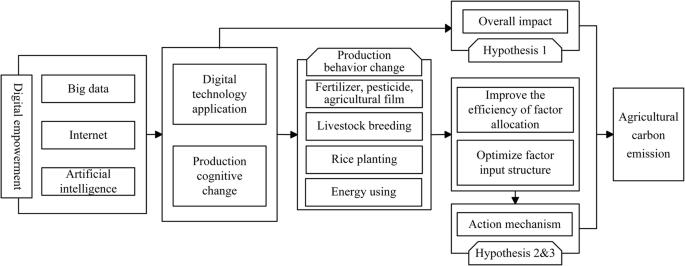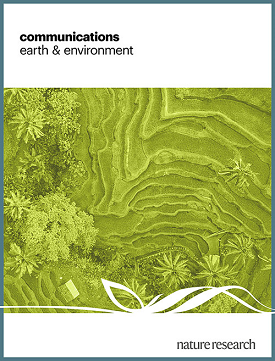Digital agriculture’s impact on carbon dioxide emissions varies with the economic development of Chinese provinces
IF 8.1
1区 地球科学
Q1 ENVIRONMENTAL SCIENCES
引用次数: 0
Abstract
Digital empowerment is a dynamic process of complementary digital technology and production factors and plays a critical role in achieving the dual carbon objectives of the carbon peak by 2030 and carbon neutrality by 2060. Here, we use the input-output method, employing panel data on environmental and social factors from 30 provincial-level regions in China from 2012 to 2021. We explore the impact of digital empowerment development on agricultural carbon dioxide emissions and underlying mechanisms. We found that the relationship between digital empowerment and carbon dioxide emissions is nonlinear and follows an inverted U-curve. The carbon dioxide emissions increase as digital empowerment increases and decrease when digital empowerment crosses the inflection point of 0.0862. Digital empowerment reduces agricultural carbon emissions by optimizing carbon-intensive factor inputs such as fertilizers and improving factor allocation efficiency. Our research provides evidence for policymakers to enable the promotion of digital empowerment of farmers across Chinese provinces. In China, the use of digital technology in agriculture increased from 2012 to 2021, and carbon dioxide emissions initially increased and then decreased due to lower and more efficient fertilizer and fuel use, according to an analysis combining the input-output method and social and environmental data.

数字农业对二氧化碳排放的影响随中国各省经济发展而变化
数字赋能是数字技术与生产要素互补的动态过程,对实现 2030 年碳峰值和 2060 年碳中和的双碳目标起着至关重要的作用。在此,我们采用投入产出法,利用中国 30 个省级地区 2012 年至 2021 年的环境和社会要素面板数据。我们探讨了数字赋权发展对农业二氧化碳排放的影响及其内在机制。我们发现,数字赋权与二氧化碳排放之间的关系是非线性的,呈倒 U 型曲线。二氧化碳排放量随着数字赋权的增加而增加,当数字赋权越过 0.0862 的拐点时,二氧化碳排放量减少。数字赋权通过优化化肥等碳密集型要素投入和提高要素配置效率,减少了农业碳排放。我们的研究为政策制定者在中国各省促进农民数字赋权提供了证据。根据投入产出法与社会和环境数据的结合分析,2012 年至 2021 年期间,中国农业中数字技术的使用有所增加,由于化肥和燃料的使用更少、效率更高,二氧化碳排放量先增加后减少。
本文章由计算机程序翻译,如有差异,请以英文原文为准。
求助全文
约1分钟内获得全文
求助全文
来源期刊

Communications Earth & Environment
Earth and Planetary Sciences-General Earth and Planetary Sciences
CiteScore
8.60
自引率
2.50%
发文量
269
审稿时长
26 weeks
期刊介绍:
Communications Earth & Environment is an open access journal from Nature Portfolio publishing high-quality research, reviews and commentary in all areas of the Earth, environmental and planetary sciences. Research papers published by the journal represent significant advances that bring new insight to a specialized area in Earth science, planetary science or environmental science.
Communications Earth & Environment has a 2-year impact factor of 7.9 (2022 Journal Citation Reports®). Articles published in the journal in 2022 were downloaded 1,412,858 times. Median time from submission to the first editorial decision is 8 days.
 求助内容:
求助内容: 应助结果提醒方式:
应助结果提醒方式:


